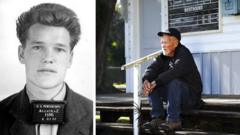At 93, Charlie Hopkins recalls his lonely experiences at Alcatraz and critiques Donald Trump’s recent plan to revive the notorious prison for serious offenders, citing potential impracticalities.
Alcatraz's Last Living Inmate Responds to Trump's Reopening Plan

Alcatraz's Last Living Inmate Responds to Trump's Reopening Plan
Charlie Hopkins, the possible last surviving inmate of Alcatraz, shares his reflections on prison life and comments on the former president's proposal to reopen the facility.
In a recent interview, Charlie Hopkins, who may be the last living former inmate of Alcatraz, expressed his thoughts on former President Donald Trump’s controversial proposal to reopen the infamous prison. Now 93 and residing in Florida, Hopkins reflected on his experiences during the three years he spent in Alcatraz, where he served time on a range of charges, including kidnapping and robbery.
Sent to the island prison in 1955, Hopkins describes the environment as "deathly quiet," often recalling the sounds of ships passing in the night, a stark reminder of the isolation he felt. He was transferred to Alcatraz after causing disturbances at other correctional facilities, where he ultimately served a 17-year sentence. While living there, he built friendships with notorious criminals and even participated in an unsuccessful escape plan.
Despite the prison’s reputation, Hopkins recalls Alcatraz during his time as both clean and devoid of distractions—a place where inmates had limited options for activities. "There was nothing to do," he stated, emphasizing the lack of books and entertainment during his incarceration. Many of his days were spent cleaning the facility, further contributing to an already bleak daily routine.
The iconic 22-acre island, which has housed infamous criminals like Al Capone and Robert Stroud, was established as a military prison before transforming into a federal facility to address the rising organized crime in the 1930s. Yet, it wasn't just the dangerous inmates that made the prison notorious; the numerous escape attempts defined its legacy, with 14 attempts and 36 inmates trying to break free during its operational years.
Trump's idea to reopen Alcatraz comes at a time when crime and punishment discussions are prevalent in political rhetoric. Despite his support for Trump, Hopkins expressed skepticism about the feasibility of reopening the once-operational prison, highlighting the potential costs associated with repairs and renovations. "It would be so expensive," he claimed, stressing the need for modern facilities and plumbing systems, which were outdated even during his time there.
Moreover, he suggested that Trump's proposal could be more a political maneuver than a genuine initiative. "He don’t really want to open that place," Hopkins surmised, indicating that the former president might be using the idea to reinforce a message about law and order.
After leaving Alcatraz in 1958, Hopkins transitioned into a new life, securing various jobs, including work at a truck stop, and began to reflect on his past. He has even penned a memoir detailing his journey, underlining the struggles he confronted.
While he recognizes his role in perpetuating crime, Hopkins also exhibits a clear understanding of the deeper issues at play, both for himself and for the broader prison system. His story serves as a reminder of the complexity behind incarceration and the stories that remain untold in the legacy of Alcatraz.



















